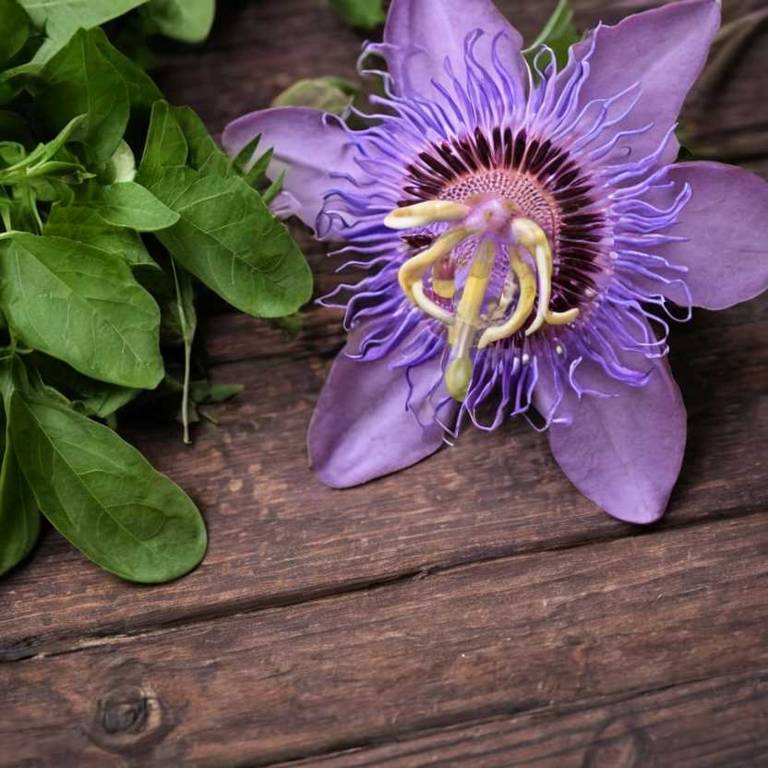By Leen Randell
Updated: Jul 20, 2024
10 Medicinal Constituents Of Passiflora Incarnata (Maypop)

Passiflora incarnata has active constituents such as flavonoids, alkaloids, and lignans that contribute to its medicinal properties.
These constituents have anti-anxiety, sedative, and antioxidant effects, which can alleviate symptoms of anxiety and insomnia.
The flavonoids, in particular, have been shown to improve mood and reduce inflammation, potentially helping individuals with depression and anxiety disorders to live more balanced lives and improve their overall mental well-being.
This article explains in details the 10 best active constituents of Passiflora incarnata.
1. Flavonoids
Passiflora incarnata flavonoids is a type of phytochemical compound found in its leaves and stems.
These compounds have been shown to possess numerous health benefits, including anti-inflammatory, antioxidant, and antimicrobial properties.
Flavonoids present in Passiflora incarnata have been demonstrated to protect against oxidative stress, improve cardiovascular health, and exhibit immunomodulatory effects, making them a valuable component of natural remedies for various diseases.
2. Alkaloids
3. Hydroxycinnamic acids
Passiflora incarnata hydroxycinnamic acids is a group of phenolic compounds that have been identified in its leaves and stems.
These acids are known for their potential antioxidant and anti-inflammatory activities, which may contribute to the plant's traditional use in folk medicine.
Specifically, maypop contains a combination of caffeic acid, ferulic acid, and p-coumaric acid, which have been shown to possess bioactive properties that could be beneficial for human health.
4. Phenolic acids
Passiflora incarnata phenolic acids is a group of bioactive compounds found in its fruit and leaves.
These phenolic acids have been studied for their potential health benefits, including antioxidant, anti-inflammatory, and antimicrobial properties.
Specifically, P. incarnata has been shown to contain high levels of caffeic acid, ferulic acid, and quinic acid, which may contribute to its traditional uses in folk medicine for treating various ailments, such as fever, rheumatism, and respiratory issues.
5. Isoflavones
Passiflora incarnata isoflavones is a type of plant-based compound found in the Passion Flower (Passiflora incarnata).
These isoflavones have been extensively studied for their potential health benefits, including antioxidant and anti-inflammatory properties.
Research suggests that they may help alleviate menopausal symptoms such as hot flashes and mood swings, as well as improve cognitive function and reduce anxiety.
6. Quercetin
Passiflora incarnata quercetin is a type of flavonoid glycoside found in this plant.
It has been shown to have anti-inflammatory and antioxidant properties, making it potentially beneficial for the treatment of various health conditions, such as allergies, asthma, and cardiovascular disease.
Quercetin in Passiflora incarnata may also help to reduce oxidative stress and improve overall immune function.
7. Kaempferol
Passiflora incarnata kaempferol is a flavonoid compound found in this plant species.
It has been studied for its potential health benefits, including antioxidant and anti-inflammatory properties.
Kaempferol has been shown to have effects on the body's inflammatory response, which can be beneficial in reducing the risk of chronic diseases such as cardiovascular disease and cancer.
8. Luteolin
Passiflora incarnata luteolin is a flavonoid compound found in its leaves and stems.
This bioactive molecule has been traditionally used to treat various health issues, including inflammation, fever, and respiratory problems. Research suggests that luteolin from P. incarnata exhibits significant antioxidant, anti-inflammatory, and antimicrobial properties, making it a potential natural remedy for several diseases.
Further studies are needed to fully explore its therapeutic applications.
9. Apigenin
Passiflora incarnata apigenin is a flavonoid compound found in its aerial parts.
This bioactive molecule has been extensively studied for its potential therapeutic properties, including anti-inflammatory, antioxidant, and antimicrobial activities.
Apigenin has been shown to have a significant impact on various physiological processes, such as cardiovascular health, cancer prevention, and neuroprotection, making it a promising area of research in the field of phytotherapy.
10. Caffeic acid
Passiflora incarnata caffeic acid is a type of phenolic compound found in its leaves and stems.
This antioxidant has been shown to exhibit anti-inflammatory, antimicrobial, and antiviral properties. Studies have demonstrated that caffeic acid from Passiflora incarnata can inhibit the growth of certain cancer cells and also possess potential neuroprotective effects.
Its bioactive compounds are believed to contribute to the plant's traditional uses in folk medicine for various ailments.